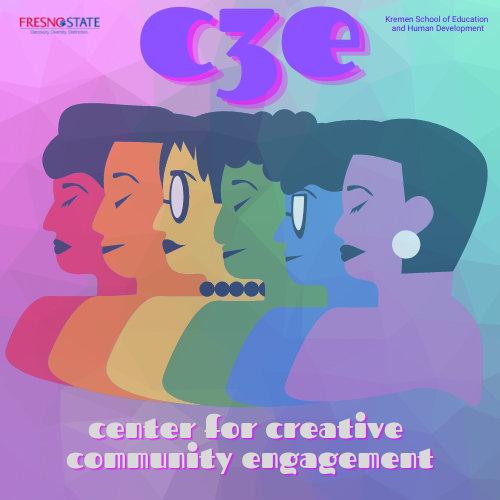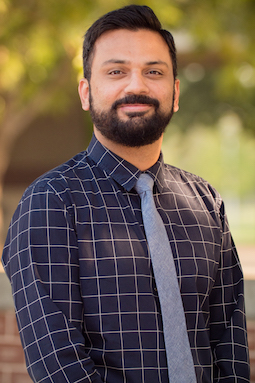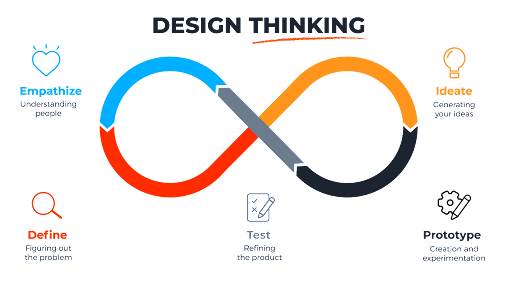Kremen School of Education and Human Development
Center for Creative Community Engagement (C3E)
A community-driven design-based approach to create diversity, equity, & inclusion
Welcome!


Dr. Rohit Mehta
Equity and Social Justice Endowed Chair
Assistant Professor
Department of Curriculum and Instruction
Kremen School of Education and Human Development
California State University, Fresno
Dear community members,
Welcome to the Center for Creative Community Engagement (C3E), a community-driven
and project-based approach to addressing social justice and equity issues through
creative collaboration. The purpose of the center is to become a space for:
- Students: a space for systemically marginalized Black and Brown youth to engage in project-based community problem defining and solving to address social justice issues in their lived experiences.
- Teachers: a space for educators (in-service and pre-service teachers, university faculty) committed to justice-oriented social change to engage in pedagogical approaches that move beyond behavioral disciplining and policing to fostering creativity.
- Parents: a space for parents, guardians, and other stakeholders to engage in anti-racist dialog and culturally sustaining engagement with social justice issues in their lived experience
- Leaders: a space for community leaders to collaborate on creative solutions to local issues that are not dependent on the state of local politics but instead focus on offering new alternative spaces for youth to engage in disciplinary knowledge and self-actualization.
If you are interested in working with the center on a community-driven project, please
apply here: Center for Creative Community Engagement
All students below the age of 18 will need parental permission to participate.
About the Facilitator
Dr. Rohit Mehta will facilitate all design workshops. Dr. Mehta is an Assistant Professor of Secondary Curriculum with Instructional Technology in the Department of Curriculum and Instruction at Kremen School of Education and Human Development at California State University, Fresno. He is a teacher educator with a research background in creativity, teaching with technology, and designing equitable and inclusive learning environments. He is a proponent of community-led interdisciplinary inquiries that allow spaces for community stakeholders to participate in addressing key challenges in their lived experiences through creative design-based approaches to equity and social justice. mehtarohit.com
What We Do
Community members interested in participating in design-based approaches to creative problem defining and solving can apply to be a participant in the center. Each year, a cohort of interested participants will tackle a social justice issue in their community and lived experience. Through collaborative meetings, the cohort will work together on identifying, defining, rethinking, and resolving challenges in the community that exacerbate inequity. Participants will get a chance to:
- engage in creative activities to help them reflect on their own process and well-being.
- learn several applications of design thinking to address social inequity problems.
- collaborate in raising critical cultural consciousness.
- actively create local art and culture.
- conduct research-based inquiries that are inclusive in ways of knowing.

The central aspect of the center will be the design workshops. Community members will work as a cohort to engage in a design process tackling a community project. Four (4) workshops will be facilitated at Fresno State guiding the cohort through the design process. These workshops will be structured around the Stanford Design Thinking framework (see Figure). Each workshop will cumulatively build on project-based and community-based approaches to address a key social justice issue in our community.
Timeline
Four workshops will be conducted in the fall and spring semesters between October and February with follow-up team meetings if needed. Design is not a linear process and can take several iterations to come to a final stage. With feedback from community members and stakeholders, we will often return to upgrade and revise our design. Here is a tentative structure of the four workshops.
Design Workshop 1:
Who are we?
- Self-Love
- Exercises in mindfulness
- Understanding the science of mindfulness
- Relationship between mindfulness and creativity
- Becoming creative as a community
Empathizing
- Who do we work for/with?
- Who are our people?
- What are their needs?
- What are our needs?
- Where is justice?
- What does justice look like?
Design Workshop 2:
Defining
- What are some projects that need our attention?
- How are these situations related to issues of inequity and injustice?
- What data do we need to address the situation?
- What counts as data?
- What are credible sources?
- How do we come to know?
- What are some potential solutions/resolutions?
Ideating
- What are some potential solutions/resolutions?
- What would a working solution look like?
- Who needs to be involved in the solutions?
- How much space do we need?
- How much time do we need?
- How do we measure effectiveness?
Design Workshop 3:
Prototyping
- What tools do we need to design a prototype for our solution?
- Who do we need to participate?
- How long will it take for us to design a working prototype?
Testing - How do we implement the solution to test its effectiveness?
- How do we measure success?
- What feedback can we take for improvement
Design Workshop 4:
Testing
- How doe we implement the solution to test its effectiveness?
- How do we measure success?
- What feedback can we take for improvement?
- Reiterating and Revising
- Marketing and Publicizing
- Who needs to hear this?
- Who will implement this?
Compensation
All participants will receive a stipend of $500 at the end of the academic year in
spring. The space for participants is limited.
If you are interested in working with the center on a community-driven project, please apply using this form.
Behavior Management and Policing in Schools
Black and Brown youth in public schools, including Fresno, are overrepresented in behavioral disciplining such as expulsions and suspensions where they are likely to miss learning opportunities. These youth in schools are also more likely to be labeled as violent and referred to law enforcement, pushing them further into the school-to-prison pipeline. Black and Brown youth with disabilities are more likely to receive stricter behavioral disciplining than other Black, Brown, Asian, and White youth (Barnes & Motz, 2018; Nance, 2015). Further, over-disciplining has been associated with exacerbating trauma (Dutil, 2020) among Black and Brown youth facing systemic racial discrimination all their lives, including in places of learning such as public schools.
Solutions to addressing over-disciplining and over-policing of Black and Brown youth in schools call for multi-pronged approaches that include but are not limited to changing the disciplining culture and perspectives of teachers, reducing funding for police (school resource officers) in school, increasing funding and services to engage teachers and administrators in culturally sustainable anti-racism work, and creating opportunities for Black and Brown youth to engage in play and creative activities that help with self-actualization and recover from/deal with trauma.
- Barnes, J. C., & Motz, R. T. (2018). Reducing racial inequalities in adulthood arrest by reducing inequalities in school discipline: Evidence from the school-to-prison pipeline. Developmental Psychology, 54(12), 2328–2340. https://doi.org/10.1037/dev0000613
- Dutil, S. (2020). Dismantling the School-to-Prison Pipeline: A Trauma-Informed, Critical Race Perspective on School Discipline. Children & Schools, 42(3), 171–178. https://doi.org/10.1093/cs/cdaa016
- Nance, J. P. (2015). Over-Disciplining Students, Racial Bias, and the School-to-Prison Pipeline School Inequality: Challenges and Solutions, Allen Chair Issue 2016: School Discipline Policies. University of Richmond Law Review, 50(3), 1063–1074.
Creating Black Joy
When it comes to the engagement of Black and Brown youth, Bettina Love suggests that creating black joy is crucial for social change. “Finding joy in the midst of pain and trauma is the fight to be fully human… Acknowledging joy is to make yourself aware of your humanity, creativity, self-determination, power, and ability to love abundantly” (Love, 2019, p.119-120).
Centering the importance of creating joy in the work we do is important to deal with fight of being fully human. A key ongoing project of this center is to assist Black and Brown youth in finding and creating joy in their own day-to-day lives through self-exploratory and collaborative creativity. By participating in mindfulness theory and practice, creative projects and exercises, and activities for mind-body unity and balance, participants will learn to create a sense of well-being for themselves and others.
- Love, B. L. (2019). We want to do more than survive: Abolitionist teaching and the pursuit of educational freedom. Beacon Press.
- Project-Based Learning
- Community-Based Learning
- Design Thinking
- Transdisciplinary Creativity
- Creating Black Joy
- Play
- Culturally Sustaining Pedagogy
- Mindfulness and Spirituality in Education
- Aesthetics and Beauty in STEM
- Media and Technology Literacy
- Multiliteracies and Transliteracies
- Decolonization in Education
- Critical Race Theory
- Anti-Black Racism and Normalization of Whiteness
- Neurodiversity
- Gender and Sexual diversity
2. Richardson, C., Henriksen, D., Mehta, R. & Mishra, P. (2022) Seeing things in the here and now: Exploring mindfulness and creativity with Viviana Capurso. TechTrends, 66(3), 394-400. https://doi.org/10.1007/s11528-022-00722-z
3. Gleason, B., & Mehta, R. (2022). A pedagogy of care: Critical humanizing approaches to teaching and learning with technology. Italian Journal of Educational Technology. Advance Online Publication. 1-16. doi: 10.17471/2499-4324/1278
4. Mehta, R. & Henriksen, D. (2022). To democratize, first decolonize: Approaches beyond eurocentric and colonial epistemologies in creativity. Review of Research in Education, 46(1), 105-133.
5. Henriksen, D., Creely, E., & Mehta, R. (2022). Rethinking the Politics of Creativity: Posthumanism, Indigeneity, and Creativity Beyond the Western Anthropocene. Qualitative Inquiry. https://doi.org/10.1177/10778004211065813
6. Mehta, R., Henriksen, D. & Mishra, P. (2020) “Let children play!”: Connecting evolutionary psychology and creativity with Peter Gray. TechTrends, 64(5), 684–689 https://doi.org/10.1007/s11528-020-00535-y
7. Mehta, R. & Aguilera, E. (2020). A critical approach to humanizing pedagogies in online teaching and learning. International Journal of Information and Learning Technology, 37(3), 109-120. https://doi.org/10.1108/IJILT-10-2019-0099
8. Mehta, R., Henriksen, D., & Deep-Play Research Group. (2019). An Embodied, Dialogic Endeavor: Towards a Posthumanizing Approach to Creativity with Dr. Kerry Chappell. TechTrends, 63(1), 6-12.
9. Henriksen, D., Mehta, R. & Rosenberg, J. (2019). Supporting a Creatively Focused Technology Fluent mindset among educators: Survey results from a five-year inquiry into teachers’ confidence in using technology. Journal of Technology and Teacher Education, 27(1), 63-95.
10. Mehta, R., Henriksen, D. & Rosenberg, J. M. (2019). It’s not about the tools. Educational Leadership, 76(5), 64-69.
- hooks, B. (2013). Teaching community: A pedagogy of hope. Routledge.
- hooks, B. (2014). Teaching to transgress. Routledge.
- Ladson-Billings, G. (1995). Toward a theory of culturally relevant pedagogy. American Educational Research Journal, 32(3), 465-491.
- Love, B. L. (2019). We want to do more than survive: Abolitionist teaching and the pursuit of educational freedom. Beacon Press.